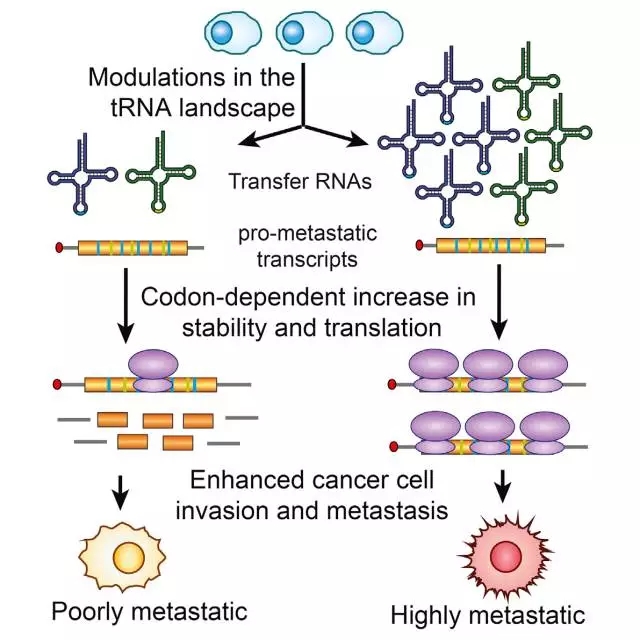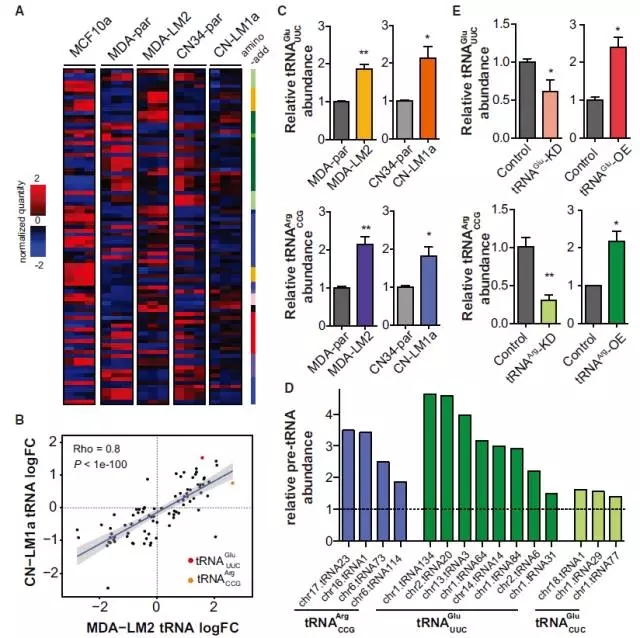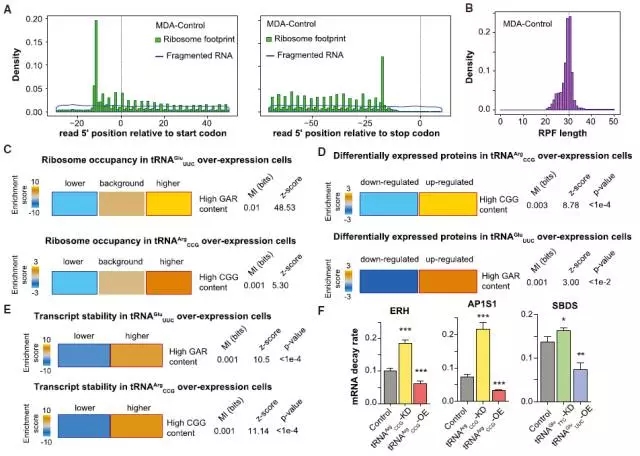Cell major discovery: tRNAs promote tumor metastasis

Transporter RNAs (tRNAs) were originally thought to be static participants in gene expression, but on June 2nd, an article published by the H. Goodarzi research team at Rockefeller University on Cell proved that tRNA is also a dynamic regulator of gene expression that can affect disease. progress. Let's take a look at their research.
H. Goodarzi's team found that in human breast cancer, elevated levels of specific tRNAs can cause cells to metastasize . Related experiments have shown that tRNA Glu UUC and tRNA Arg CCG are boosting factors for breast cancer metastasis. The increase in these tRNAs enhances the stability and ribosome binding of the transcripts, which are rich in cognate codons. In particular tRNA Glu UUC by direct expression of enhanced EXOSC2 reinforcing GRIPAP1 constitute "inducible" pathway by a tRNA-driven, thereby promoting cancer metastasis. tRNA thus becomes a dynamic regulator of gene expression, while tRNA codon profiling can affect disease progression.
In this study, the researchers set up experimental groups of five different human cell lines. The five cells are: a non-tumor epithelial cell line, a low metastatic breast cancer cell line MDA-231 and CN34, and their corresponding highly metastatic sub-plants MDA-LM2, CN-LM1a.
The original tRNAs expression will intervene in cancer cell metastasis

Through the special tRNA database technology (this is the key in this study, see the original text), the tRNA expression profile obtained by high-throughput sequencing shows that the expression level of tRNAs in breast cancer cell lines is different from those of non-tumor cells. The researchers selected cell lines with high metastatic potential in the MDA-231 and CN34 parental cancer cell populations, and found that they had similar changes in tRNAs abundance. These synergistic adjustments at the level of tRNAs suggest that tRNAs play a guiding role in promoting cancer progression. The results showed that tRNA Arg CCG and tRNA Glu UUC in highly metastatic cells ( MDA-LM2 and CN-LM1a ) showed a synergistic increase in tRNAs precursor levels, mature tRNAs levels or loci compared to parental cells . So what does the increase in tRNA Arg CCG and tRNA Glu UUC mean? The researchers obtained the following conclusion through experiments.
 They are behind the scenes: tRNA Glu UUG and tRNA Arg CCG
Decreased tRNA Glu UUG and tRNA Arg CCG levels in MDA-LM2 cells will reduce the ability of cells to metastasize; conversely, overexpression of tRNA Glu UUG and tRNA Arg CCG levels will result in greater metastatic ability in cells with low metastatic potential. These results indicate that increased abundance of specific tRNAs promotes metastasis of breast cancer cells. At the same time, the cells that overexpress these tRNAs have a significantly enhanced invasive ability;
The team validated the bio-relevance of these findings and excluded the effects of off-target effects caused by shRNA expression. It also demonstrated that tRNA Glu UUG and tRNA Arg CCG expression levels in human breast cancer cells interact and predict metastatic propensity .
What? They also affect the transcriptional stability and translation process?

In addition to promoting metastasis, what are the effects of over-expressing these two tRNAs ? The researchers found that in tRNA Glu UUC overexpressing cells, genes with higher GAR ( GAA and GAG ) content in the coding sequence were significantly enriched; similarly, genes with high CGG content would be more abundant in tRNA Arg CCG overexpressing cells. High translation volume. In addition, by affecting the codon usage and cellular tRNA content of the protein, protein expression levels can be regulated; in tR NA Glu UUG and tRNA Arg CCG overexpressing cells, the corresponding transcripts with higher GAR and CGG content are generally more stable. In conclusion, the expression level of tRNA Glu UUG in tumor cells has an important regulatory effect on its protein profile, and the change in codon usage of the target protein can partially support this conclusion.
Discover the downstream target of tRNA Glu UUG !
According to cancer researchers, the results caused by the regulation of tRNA Glu UUG tRNA Glu UUG and the effects of the metastasis, assumptions made: a core set of genes may be downstream of the total tRNA Glu UUG regulator as Main factors. Using genome-wide databases and ribosomal expression profiles, they identified EXOSC2 and GRIPAP1 as the core target genes, which are higher in highly metastatic cells than in low metastatic cells. Using Western blots and ectopic dominant experiments, the researchers demonstrated that EXOSC2 and GRIPAP1 are downstream targets of overexpressing tRNA Glu UUG , and when tRNA Glu UUG is overexpressed, cancer cells can use these proteins to cause pre-metastatic effects.
The researchers also conducted clinical relationship experiments, and the data not only supported their experimental results on the role of tRNAs regulation in promoting metastasis, but also supported the discovery of tRNAs- based pathways as a recognition transcription. A method of post-regulating genes, and usually such genes may not be found by traditional transcriptome profiles.
tRNA bias, relationship between ribosome occupancy and protein expression

The researchers also tried to clarify the relationship between tRNA bias, ribosomal occupancy and protein expression. They observed that with the increase of ribosome occupancy, the genes with high tRNA bias were significantly enriched; the expression levels of different tRNAs could affect the translation results by affecting the abundance of ribosomal attachment transcription. Due to the decisive role of tRNAs in transcription, the imbalance of tRNAs abundance can seriously affect the cellular protein expression profile. The results show that the tRNAs codon profile can seriously affect the expression of cancer subpopulations. Differentiated tRNAs expression levels can affect translation results by affecting ribosomal binding transcript abundance.
This study suggests an idea that, in addition to many known regulatory mechanisms, regulation of cancer cell tRNA profiles can affect cancer process promoter expression . The results also show that specific tRNAs can form " inducible " pathways with their direct acting transcripts that enrich their cognate codons. It is worth noting that although this study only focuses on breast cancer metastasis, this research based on tRNA expression profiling is universal and can be used in other disease research and extended to other models and species.
Original: Goodarzi H, Nguyen HCB, Zhang S, et al. Modulated Expression of Specific tRNAs Drives Gene Expression and Cancer Progression [J]. Cell, 2016, 165(6): 1416-1427.
Related meeting recommendations
2017 4th non-coding RNA and epigenetic research experience exchange meeting
Meeting time: 2017.6.10 -6.11 Meeting place: Guangzhou Science City
Conference details: http://
We're professional Resectoscope Electrode manufacturers and suppliers in China, specialized in providing high quality medical instruments with reasonable price. We warmly welcome you to buy or wholesale bulk Resectoscope Electrode for sale here and get quotation from our factory.
Resectoscope Electrode,Resectoscope Loop,Bipolar Resectoscope,Resectoscope Working Element
Tonglu WANHE Medical Instrument Co., Ltd , https://www.tlvanhurhealth.com